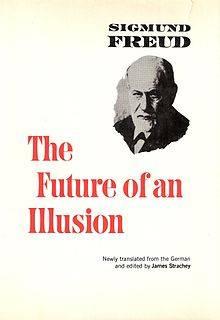In the final installment of the series (Hume, Feuerbach, Marx, and Darwin) on early naturalist-explanatory theories of religion, we come to Sigmund Freud. Before proceeding, I want to note that I have not attempted to survey the entirety of each theorist’s work on religion. Instead, I have mined their works from an anthropological perspective. This has revealed some especially interesting thoughts on animism or the animist worldview. Though not included in this series, Nietzsche had similar insights into animism that I covered in this post. All citations are to the 1989 Norton edition of Freud’s Future of an Illusion.
Though Freud speculatively waded into early anthropological debates on religion with Totem and Taboo: Resemblances Between the Psychic Lives of Savages and Neurotics (1913), his mature thinking on the subject did not appear until 1927, when he published The Future of an Illusion. Freud contends that proto-religious ideas arose originally because humans found themselves helpless and terrified by the awesome powers of nature. To grapple with these emotions, humans project themselves onto and into nature:
Impersonal forces and destinies cannot be approached; they remain eternally remote. But if the elements have passions that rage as they do in our own souls, if death itself is not something spontaneous but the violent act of an evil Will, if everywhere in nature there are Beings around us of a kind that we know in our own society, then we can breathe freely, can feel at home in the uncanny and can deal by psychical means with our senseless anxiety. We are still defenceless, perhaps, but we are no longer helplessly paralysed; we can at least react. Perhaps, indeed, we are not even defenceless. We can apply the same methods against these violent supermen outside that we employ in our own society; we can try to adjure them, to appease them, to bribe them, and, by so influencing them, we may rob them of a part of their power (20-21).
[T]he humanization of nature is derived from the need to put an end to man’s perplexity and helplessness in the face of its dreaded forces, to get into a relation with them and finally to influence them….Primitive man has no choice, he has no other way of thinking. It is natural to him, something innate, as it were, to project his existence outwards into the world and to regard every event which he observes as the manifestation of beings who at bottom are like himself. It is his only method of comprehension (27).
[W]hen man personifies the forces of nature he is again following the infantile model. He has learnt from the persons in his earliest environment that the way to influence them is to establish a relation with them; and so, later on, with the same end in view, he treats everything else that he comes across in the same way as he treated those persons (28).
At this stage of his analysis, Freud has said nothing about religion; he is simply describing the emotional states and mental strategies used by early (or “pre-civilized”) humans to comprehend and control the world. He is, in other words, describing something like animism.
To get to religion proper, people must have ideas about gods. These are imagined when people realize they can never escape the terrors of nature and are helpless in the face of its powers. On the one hand people are dependent on nature but on the other they need protection from it. Because protection is associated with parents, and memories of childhood dependence and attachment are so strong, adults wish for substitute parents. They fulfill this wish by imagining gods and religion is born:
When the growing individual finds that he is destined to remain a child for ever, that he can never do without protection against strange superior powers, he lends those powers the features belonging to the figure of the father; he creates for himself the gods whom he dreads, whom he seeks to propitiate, and whom he nevertheless entrusts with his own protection. Thus his longing for a father is a motive identical with his need for protection against the consequences of human weakness. The defence against childish helplessness is what lends its characteristic features to the adult’s reaction to the helplessness which he has to acknowledge – a reaction which is precisely the formation of religion (30).
Once psychologically formed, god ideas develop over long periods of time into modern religions. Freud, clearly influenced by Marx, contends that the most marked development occurs in conjunction with “civilization” (i.e., the Neolithic transition) – when people begin living together in stratified societies, there is a need for regulation and control. Religion provides this while simultaneously ameliorating the dissatisfactions or “neuroses” that always accompanies life in large-scale, coercive societies.
Freud’s treatment of religion in Future of an Illusion is sometimes seen as a complete account or history of religion. Freud did not, however, intend it as such — he considered it simply to be a supplement to other more systematic treatments, such as those given by David Hume, Edward Tylor, and Charles Darwin. So while Freud here treats religion as a purely psychological (or emotional) phenomenon, he thought the issue far more complex and unlikely to be explained by any one kind of theory. For those seeking a survey of Freud’s work on religion, I recommend Robert Banks’ article “Religion as Projection: A Re-Appraisal of Freud’s Theory.”


